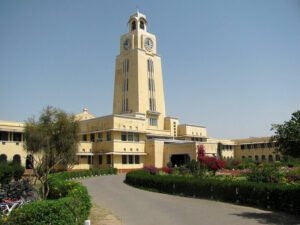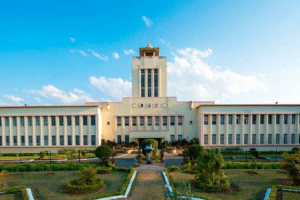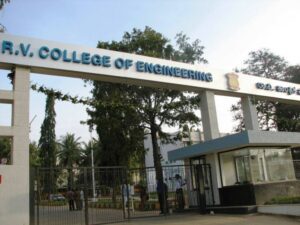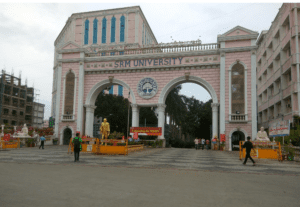Engineering is a very diverse field with six major branches – Mechanical, Chemical, Civil, Electrical, Management, and Geotechnical and hundreds of subcategories under each branch. Jobs and career prospects for engineering students are extensive. Countless job opportunities are awaiting students who complete the course, both in the government and private sector. While lakhs of students appearing for the entrance test to get admission in the prestigious IITs of India but only a few get selected. But there are many private universities in the country that will help you achieve the dream of getting quality education and make you ready for the real world. In this article, we will look at the top private engineering colleges in India.
- Birla Institute Of Technology And Science, Pilani
- Vellore Institute Of Technology, Vellore
- Birla Institute Of Technology, Mesra
- RV College Of Engineering, Bangalore
- SRM Institute Of Science And Technology, Chennai
- Thapar Institute Of Engineering And Technology, Patiala
- Manipal Institute Of Technology, Manipal
- Frequently Asked Questions
Birla Institute Of Technology And Science, Pilani
 BITS Pilani is a non-profit private university established in 1964, in Pilani, Rajasthan. Apart from the campus in Pilani, BITS has two other campuses in Goa and Hyderabad and one international campus in Dubai. The programs offered by BITS include four years of integrated first-degree programs in mathematics, science, engineering, technology, pharmacy, Masters program in engineering, pharmacy, public health and business administration, doctoral degrees in engineering, pharmacy, natural sciences, public health and business administration. The entrance exam tests the candidate’s knowledge based on higher secondary curricula, reasoning, and analytical abilities in physics, chemistry, mathematics, English, and logical reasoning.
BITS Pilani is a non-profit private university established in 1964, in Pilani, Rajasthan. Apart from the campus in Pilani, BITS has two other campuses in Goa and Hyderabad and one international campus in Dubai. The programs offered by BITS include four years of integrated first-degree programs in mathematics, science, engineering, technology, pharmacy, Masters program in engineering, pharmacy, public health and business administration, doctoral degrees in engineering, pharmacy, natural sciences, public health and business administration. The entrance exam tests the candidate’s knowledge based on higher secondary curricula, reasoning, and analytical abilities in physics, chemistry, mathematics, English, and logical reasoning.
Vellore Institute Of Technology, Vellore
 Vellore Institute of Technology is affiliated with UGC, established in 1984, in Vellore, Tamil Nadu. The institute offers 54 Undergraduate, 34 Postgraduate, 9 Integrated, 2 Research, and 2 M.Tech Industrial Programmes. VIT has other campuses in Amravati, Bhopal, and Chennai. Candidates applying for the Undergraduate Engineering should have secured a minimum aggregate of 60% in Physics, Chemistry, and Mathematics/Biology in intermediate examinations. BIT Vellore offers B.Tech programs in biotechnology, Computer Science, and Engineering with specialization in Bioinformatics, Electronics, and Communication with a specialization in Biomedical Engineering.
Vellore Institute of Technology is affiliated with UGC, established in 1984, in Vellore, Tamil Nadu. The institute offers 54 Undergraduate, 34 Postgraduate, 9 Integrated, 2 Research, and 2 M.Tech Industrial Programmes. VIT has other campuses in Amravati, Bhopal, and Chennai. Candidates applying for the Undergraduate Engineering should have secured a minimum aggregate of 60% in Physics, Chemistry, and Mathematics/Biology in intermediate examinations. BIT Vellore offers B.Tech programs in biotechnology, Computer Science, and Engineering with specialization in Bioinformatics, Electronics, and Communication with a specialization in Biomedical Engineering.
Birla Institute Of Technology, Mesra
 Mesra is a deemed university, established in 1955 in Mesra, Jharkhand. It is affiliated with the Institute of Science and Management, Ranchi. CAD Laboratory, Central Instrumentation Facility, Central Computing facilities, and well-equipped Central library are some of the features of the campus. BIT has many other branches in the country, namely in Allahabad, Jaipur, Kolkata, Noida, Patna, Deoghar, and Lalpur. International centers are in Oman and UAE.
Mesra is a deemed university, established in 1955 in Mesra, Jharkhand. It is affiliated with the Institute of Science and Management, Ranchi. CAD Laboratory, Central Instrumentation Facility, Central Computing facilities, and well-equipped Central library are some of the features of the campus. BIT has many other branches in the country, namely in Allahabad, Jaipur, Kolkata, Noida, Patna, Deoghar, and Lalpur. International centers are in Oman and UAE.
RV College Of Engineering, Bangalore
 Rashtriya Vidyalaya College of Engineering is an autonomous private technical co-educational college established in 1963, in Bangalore, Karnataka. Besides the 11 engineering departments, RV College also has departments of architecture and computer applications. Admissions in undergraduate courses are conducted by two modes – entrance based and via management quota. The undergraduate programs offered are Aerospace Engineering, Biotechnology, Chemical Engineering, Civil Engineering. Computer Science and Engineering, Electronics and Communication Engineering, Electrical and Electronics Engineering, Industrial Engineering and Management, Information Science Engineering, Instrumentation Technology, Mechanical Engineering, and Telecommunication Engineering.
Rashtriya Vidyalaya College of Engineering is an autonomous private technical co-educational college established in 1963, in Bangalore, Karnataka. Besides the 11 engineering departments, RV College also has departments of architecture and computer applications. Admissions in undergraduate courses are conducted by two modes – entrance based and via management quota. The undergraduate programs offered are Aerospace Engineering, Biotechnology, Chemical Engineering, Civil Engineering. Computer Science and Engineering, Electronics and Communication Engineering, Electrical and Electronics Engineering, Industrial Engineering and Management, Information Science Engineering, Instrumentation Technology, Mechanical Engineering, and Telecommunication Engineering.
SRM Institute Of Science And Technology, Chennai
 SRM Institute of Science and Technology is a deemed university established in 1985, in Chennai, Tamil Nadu. SRM’s other four campuses are located in Kattankulathur, Ramapuram, Vadapalani, and Modinagar. The entrance exam tests the candidate’s knowledge in five sections- English, Aptitude, Physics, Chemistry, and Mathematics/Biology. SRM offers 55 undergraduate courses – 30 B.Tech courses, 24 BSc. Courses and a BCA Course (Bachelor of Computer Application).
SRM Institute of Science and Technology is a deemed university established in 1985, in Chennai, Tamil Nadu. SRM’s other four campuses are located in Kattankulathur, Ramapuram, Vadapalani, and Modinagar. The entrance exam tests the candidate’s knowledge in five sections- English, Aptitude, Physics, Chemistry, and Mathematics/Biology. SRM offers 55 undergraduate courses – 30 B.Tech courses, 24 BSc. Courses and a BCA Course (Bachelor of Computer Application).
Thapar Institute Of Engineering And Technology, Patiala
 Thapar Institute of Engineering and Technology is a university, established in 1956, in Patiala, Punjab. The campus constitutes of seven academic blocks and is spread across 250 acres. Thapar University offers 66 courses across seven streams– 29 BE/B.Tech courses, 1 BA (Hons) course, 1 BSc course, 15 ME/M.Tech courses, 1 MBA/PGDM course, 7 MSc courses, 2 MCA courses, 1 BBA course, 1 MA course, 1 Executive MBA/PGDM course, and 4 Ph.D. courses. The institute offers B.Tech in 8 streams- Chemical Engineering, Civil Engineering, Computer Engineering, Electrical Engineering, Electronics & Communication Engineering, Electronics & Instrumentation Engineering, Electronics & Computer Engineering, and Mechanical Engineering.
Thapar Institute of Engineering and Technology is a university, established in 1956, in Patiala, Punjab. The campus constitutes of seven academic blocks and is spread across 250 acres. Thapar University offers 66 courses across seven streams– 29 BE/B.Tech courses, 1 BA (Hons) course, 1 BSc course, 15 ME/M.Tech courses, 1 MBA/PGDM course, 7 MSc courses, 2 MCA courses, 1 BBA course, 1 MA course, 1 Executive MBA/PGDM course, and 4 Ph.D. courses. The institute offers B.Tech in 8 streams- Chemical Engineering, Civil Engineering, Computer Engineering, Electrical Engineering, Electronics & Communication Engineering, Electronics & Instrumentation Engineering, Electronics & Computer Engineering, and Mechanical Engineering.
Manipal Institute Of Technology, Manipal
 Manipal Institute of Technology is a Private Technical Educational and Research institute establishes in 1957, in Manipal, Karnataka. MIT offers undergraduate, graduate, and postgraduate courses in 17 academic departments. MIT offers B.Tech in many engineering streams including Aeronautical Engineering, Automobile Engineering, Biomedical Engineering, Biotechnology, Chemical Engineering, Civil Engineering, Computer & Communication Engineering, Computer Science & Engineering, Data Science & Engineering, Electrical & Electronics Engineering, Electronics & Communication Engineering, Electronics & Instrumentation Engineering, Industrial & Production Engineering, Information Technology, Mechanical Engineering, Mechatronics Engineering, and Media Technology.
Manipal Institute of Technology is a Private Technical Educational and Research institute establishes in 1957, in Manipal, Karnataka. MIT offers undergraduate, graduate, and postgraduate courses in 17 academic departments. MIT offers B.Tech in many engineering streams including Aeronautical Engineering, Automobile Engineering, Biomedical Engineering, Biotechnology, Chemical Engineering, Civil Engineering, Computer & Communication Engineering, Computer Science & Engineering, Data Science & Engineering, Electrical & Electronics Engineering, Electronics & Communication Engineering, Electronics & Instrumentation Engineering, Industrial & Production Engineering, Information Technology, Mechanical Engineering, Mechatronics Engineering, and Media Technology.
Frequently Asked Questions
A: Private engineering colleges in India are educational institutions that are privately owned and funded. They offer undergraduate, postgraduate, and doctoral programs in various engineering disciplines. These colleges play a significant role in providing technical education and producing skilled engineers for the industry.
A: The admission process for private engineering colleges in India generally involves the following steps:
- Entrance Exams: Candidates are required to appear for national or state-level entrance exams such as JEE Main, JEE Advanced, BITSAT, VITEEE, SRMJEEE, etc. These exams assess the candidates’ knowledge and aptitude in subjects like Physics, Chemistry, and Mathematics.
- Application and Counseling: After the entrance exams, candidates need to fill out application forms for the respective private engineering colleges they are interested in. Based on their performance in the entrance exams, candidates may be called for counseling or interview rounds conducted by the colleges.
- Seat Allotment: After the counseling process, colleges release the merit list or rank list based on the candidates’ exam scores, and seats are allotted accordingly. Candidates are required to confirm their admission by paying the necessary fees within the specified timeframe.
A: The eligibility criteria for admission to private engineering colleges may vary slightly among institutions. However, the general eligibility criteria are as follows:
- Age: Candidates should typically be 17 years of age or older at the time of admission.
- Educational Qualifications: Candidates should have completed their 10+2 or equivalent examination from a recognized board with Physics, Chemistry, and Mathematics as compulsory subjects.
- Entrance Exam: Candidates must qualify for the relevant national or state-level engineering entrance exams such as JEE Main, JEE Advanced, BITSAT, VITEEE, SRMJEEE, etc.
- Minimum Marks: Candidates must meet the minimum aggregate marks requirement in their qualifying examination, which is usually around 50-60% (may vary depending on the college and category of the candidate).
- Eligibility Certificates: Candidates belonging to certain reserved categories (such as SC/ST/OBC) may need to provide valid category certificates during the admission process.b
A: Private engineering colleges in India offer a wide range of engineering streams or disciplines. Some of the popular streams include:
- Computer Science and Engineering (CSE)
- Mechanical Engineering (ME)
- Electrical Engineering (EE)
- Electronics and Communication Engineering (ECE)
- Civil Engineering (CE)
- Chemical Engineering (ChE)
- Aerospace Engineering
- Biotechnology Engineering
- Information Technology (IT)
- Artificial Intelligence (AI) and Machine Learning (ML)
These are just a few examples, and there are many other specialized streams offered by private engineering colleges to cater to different interests and industry demands.
A: The infrastructure and faculty quality in private engineering colleges can vary among institutions. Some private engineering colleges have state-of-the-art infrastructure, well-equipped laboratories, modern classrooms, and research facilities. Similarly, the faculty quality can also vary, with some colleges having experienced professors, industry experts, and research scholars.
However, it’s important to note that not all private engineering colleges may have the same level of infrastructure and faculty quality. It’s advisable to research and visit the colleges or refer to reliable sources such as official websites, student reviews






